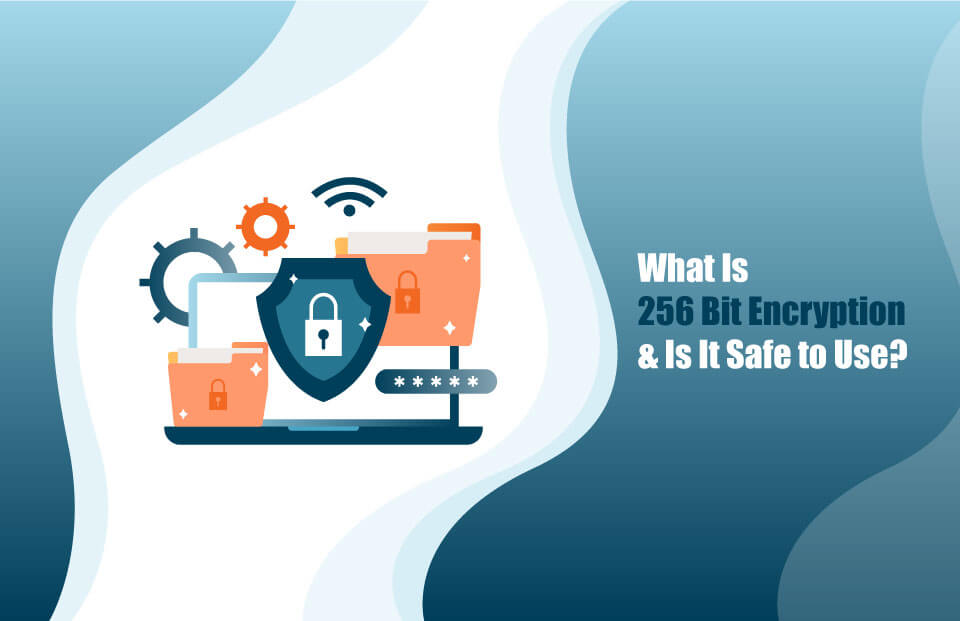What Is 256 Bit Encryption & Is It Safe to Use?

256 Bit SSL Encryption Is the Latest Encryption Standard Used for Making Secure HTTPS Connection
According to the latest encryption standards, 256 bit SSL encryption is considered the latest and safest encryption strength standard. However, when talking about 256-bit encryption, generally, users don’t know what it’s and what security it provides to websites. Therefore, let’s dig into the detail and know what you should know about 256-bit encryption.
What Is 256 Bit Encryption?
Put simply, 256-bit encryption is one of the techniques that uses 256 bit keys for encrypting and decrypting the data transmission between the server and the client. Likewise, today’s most modern algorithms and protocols, along with AES and SSL, uses 256-bit encryption to generate secure pair keys of private and public security keys.
Furthermore, encryption is one of the processes that takes plaintext data, and with the help of an algorithm, it scrambles that data into an unreadable format which is called ciphertext. Likewise, it uses encryption keys that come in different sizes. So, if we look at 256 bit encryption strength, what it means is both the algorithm’s key and length used for encrypting the data are resistant to attacks. For instance, the larger the key size of the encryption, the harder it’s to crack or use attacks such as brute force.
Henceforth, whenever you find 256 bit SSL encryption within an SSL certificate description, it means it needs 2256 different combinations. Likewise, it also means it has around 115,792,089,237,316,195,423,570,985,008,687,907,853,269,984,665,640,564,039,457,584,007,913,129,639,936 combinations, which can take anywhere 3.31 x 1056 years to be cracked.
256 Bit SSL Encryption
A secure 256 bit encryption standard is used for securing your online communication between the server and the client. It encrypts the information or data using a 256 bit long key before transmitting over the internet. Likewise, modern encryption protocols such as AES and even cheap SSL certificate uses 256 bit encryption for building a secure communication tunnel.
Some Common Uses of 256-Bit Encryption
256 bit encryption is one of the common industry standards that’s used in many different ways. And some of the most commonly seen usages of 256-bit encryption are:
- For generating symmetric session keys using browsers for starting a secure HTTPS connection.
- Encrypting data that are transmitted between a client and a server.
- Encrypting email data using an email signing certificate to assuring email is sent securely and only to an intended person.
- Encrypting the sensitive information or data of the military or government.
- Encrypt the data stored on a third-party cloud platform such as Google Drive, Dropbox, AWS, etc.
Here’s How 256-bit SSL Encryption Works
Put simply, 256 bits show the length of the encryption key. And the data transferred between the client and the server is encrypted through 256 bit encryption keys.
Nonetheless, let’s go through the below steps and understand the working of 256 bit SSL encryption:
- Whenever users try opening the website, their browser selects the robust encryption algorithm available to the browser between the browser and the server to create a random session key. Likewise, the session key is further used for encrypting and decrypting the data.
- Here, the session key is encrypted with the help of the public key of SSL. Likewise, the session key is further also encrypted with the 2048-bit key, and then it’s sent to the website server.
- The server should have an associated private key for decrypting the session key.
- Finally, once the server decrypts the session key and gets access, the secure HTTPS connection will start between the server and the browser.
Is 256-Bit Encryption Safe?
The 256-bit encryption standard is among the safest security technology of the modern technology era that uses a 256-bit long key for encrypting and decrypting the data transmitted between the client and the server. Security protocols such as DV SSL certificates and AES uses for generating the public and private key pair as a part of PKI (Public Key Infrastructure).
Likewise, all types of SSL certificates provide the same encryption security level regardless of cost, brand, or validation level you choose to go with. And when it comes to encryption, a standard SSL certificate of $10 will provide the same encryption security which is found in the SSL certificate of $100 per year.
The strength of encryption that you get through an SSL protocol entirely depends upon how good the browser and server are configured. For instance, 256-bit encryption may provide you only 128 bits level security in some cases. So, if that’s the case, your server and browser aren’t configured with the latest features that help handle 256-bit encryption.
Therefore, it’s also recommended to make sure the browser and client are configured with all the latest security features so both are compatible enough to handle 256-bit encryption.
Read Also: 128 Bit Vs 256 Bit SSL Encryption Algorithm Explained
Wrapping Up
The 256 bit encryption strength you get along with an SSL certificate depends upon the capabilities of the browser and server and how well configured they’re. For instance, 256-bit encryption may provide security of only 128 bits if the browser isn’t updated with the latest version. And on the other hand, if the browser is equipped with all the latest configurations, it’ll successfully handle 256-bit encryption. Furthermore, with SSL, 256-bit encryption is pretty strong. And, by the time an attacker using the latest computer tries cracking 256-bit encryption, it’ll get discarded, and, likely, your SSL certificate will also get replaced with the newer one.

SECTIGO PositiveSSL certificates – Save Up to 91%
Buy or renew Sectigo PositiveSSL certificate from CheapSSLWeb at a discounted price. Enable HTTPS in minutes.
